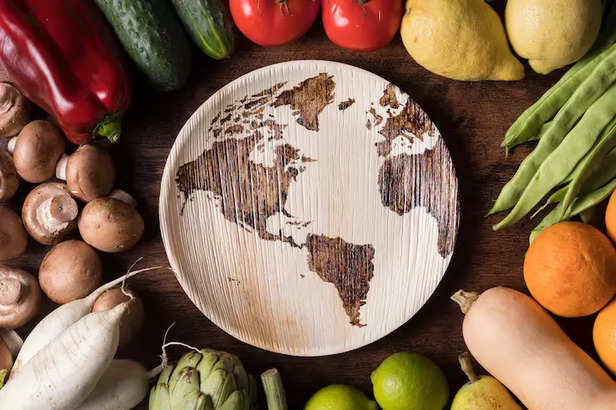The Surprising Truth About Veganism
Amritansh Nayak | Apr 21, 2025, 15:20 IST
( Image credit : Timeslife )
This page examines veganism from a number of perspectives, including its advantages for health, effects on the environment, common misconceptions, useful transition advice, and cultural roots around the world. In addition to highlighting the rich cultural heritage of veganism and its increasing significance in contemporary cultures worldwide, it also emphasizes how plant-based living fosters compassion, sustainability, and well-being.
Veganism is a lifestyle choice based on sustainability, wellbeing, and compassion rather than just a diet. The discourse surrounding veganism is becoming increasingly complex and varied as more people experiment with plant-based living. From its health advantages and environmental effects to dispelling myths, helpful transition advice, and global cultural influences, this article explores the many elements of veganism. Learn how veganism is improving lives and the environment, regardless of your level of interest or commitment.

Beyond ethical and environmental considerations, a vegan diet that emphasizes fruits, vegetables, legumes, grains, nuts, and seeds has several health advantages. Its capacity to reduce the risk of chronic diseases is one of its best-studied benefits. Compared to people who eat animal products, vegans often have lower blood pressure, lower cholesterol, and a lower risk of heart disease, according to studies. Additionally, plant-based diets are high in fiber, which promotes gut health and a healthy digestive system. Following a vegan diet, many people report better digestion and fewer gastrointestinal problems because they consume more whole foods and fewer processed ones.
Another noteworthy advantage is weight management. Without the need for calorie counting, vegan diets can help with weight control or gradual weight loss because they are naturally lower in calories and saturated fats. Many vegans also report feeling more energized and having better mental clarity. This is frequently linked to improved blood sugar control, increased vitamin intake, and the reduction of diets high in animal products. All things considered, a balanced vegan diet can support optimum health, longevity, and vitality—making it more than simply a fad but a way of life with long-term advantages.

One of the most effective ways for people to lessen their environmental impact is to adopt a vegan diet. More greenhouse gas emissions come from animal husbandry than from any other industry, including transportation. Vegans help fight climate change by drastically lowering their carbon footprint by avoiding meat and dairy. Additionally, veganism preserves important resources. Generally speaking, growing plants uses a lot less water than rearing animals.
For instance, one pound of beef requires more than 1,800 gallons of water to produce, yet the same number of lentils just require a small portion of that. Furthermore, extensive animal husbandry contributes significantly to deforestation, particularly in tropical areas where forests are cut down to make way for grazing pasture or the production of animal feed. A vegan diet contributes to biodiversity protection and the preservation of these important ecosystems.

Typical Myths and False Beliefs Regarding Veganism
Myths about veganism are common and can deter people from trying a plant-based diet. The idea that vegans don't get enough protein is among the most widespread myths. In actuality, there is more than enough protein in plant-based foods like quinoa, chickpeas, lentils, tofu, and almonds to meet daily requirements. Even vegan athletes at the top of their game thrive on these foods.
The idea that vegan cuisine is boring or bland is another misconception. Vegan food, on the other hand, is remarkably inventive, tasty, and varied. The alternatives are boundless, ranging from rich dairy-free desserts and robust plant-based burgers to spicy curries and colorful salads.
Additionally, some people think that important elements like calcium and iron are absent from a vegan diet. However, these nutrients are readily available with a well-planned diet that includes a range of whole plants and fortified foods. With increased knowledge and professional assistance, it is evident that veganism is not only palatable and nutrient-dense, but also sustainable.

It is acceptable to transition to a vegan lifestyle gradually; it doesn't have to be an all-or-nothing decision. Start by substituting plant-based items for a few animal goods in your cupboard. For instance, try tofu or lentils in well-known recipes in place of meat, or replace cow's milk with almond or oat milk. It's crucial to read food labels. Keep an eye out for unstated substances that come from animals, such as casein, gelatin, or whey. Making thoughtful decisions gets easier the more you know about vegan-friendly products and ingredients.
Additionally, eating out can be controlled. Nowadays, a lot of establishments have vegan options, and you can find plant-based food practically anywhere if you do some research or phone ahead.
At first, social settings can feel difficult, but preparation is key. At parties, bring a vegan meal to offer, and don't be embarrassed to graciously explain your preferences if someone asks.
Keep in mind that transitioning is a personal process; progress is more important than perfection. Being vegan will quickly become second nature if you concentrate on making tiny, sustainable changes that fit your lifestyle.
Although veganism may seem like a recent fad, plant-based diets have long been accepted in many societies worldwide. For instance, vegetarianism has strong ethical and religious underpinnings in India, particularly in Buddhism, Jainism, and Hinduism. A vast array of tasty plant-based foods made with legumes, grains, and vegetables may be found in traditional Indian cuisine. Similar to this, East Asian diets have traditionally prioritized plant-based foods, frequently excluding meat for spiritual reasons, especially in Buddhist populations in China, Japan, and Thailand. Natural vegan mainstays like lentils, chickpeas, yams, and greens have also been a part of Mediterranean and African diets.
Concerns about the environment, animal welfare, and human health have propelled the global vegan movement in recent years. Vegan eateries, supermarkets, and public awareness initiatives have proliferated in nations including the US, UK, and Germany. Meanwhile, in countries like Brazil and Israel, plant-based innovation is flourishing. Globally, plant-based heritage dishes are being revived and culinary creativity is being spurred by the marriage of modern veganism with tradition. The global trend toward veganism, whether motivated by cultural heritage or modern ideals, demonstrates a rising demand for sustainable, compassionate living that cuts beyond boundaries and cultural boundaries.
A powerful lifestyle choice that promotes health, safeguards the environment, and respects cultural customs is veganism. The advantages are extensive and range from enhanced well-being to environmental sustainability. One meal, one step, and one decision at a time, veganism is becoming a significant movement toward a more considerate and compassionate way of life as knowledge of the issue spreads throughout the world.
Explore the latest trends and tips in Health & Fitness, Travel, Life Hacks, Fashion & Beauty, and Relationships at Times Life!

vegan diet benefits
( Image credit : Timeslife )
The Advantages of a Vegan Diet for Health
Another noteworthy advantage is weight management. Without the need for calorie counting, vegan diets can help with weight control or gradual weight loss because they are naturally lower in calories and saturated fats. Many vegans also report feeling more energized and having better mental clarity. This is frequently linked to improved blood sugar control, increased vitamin intake, and the reduction of diets high in animal products. All things considered, a balanced vegan diet can support optimum health, longevity, and vitality—making it more than simply a fad but a way of life with long-term advantages.

environment effect of veganism
( Image credit : Timeslife )
Environmental Impacts of Veganism
For instance, one pound of beef requires more than 1,800 gallons of water to produce, yet the same number of lentils just require a small portion of that. Furthermore, extensive animal husbandry contributes significantly to deforestation, particularly in tropical areas where forests are cut down to make way for grazing pasture or the production of animal feed. A vegan diet contributes to biodiversity protection and the preservation of these important ecosystems.

belief regarding veganism
( Image credit : Timeslife )
Typical Myths and False Beliefs Regarding Veganism
The idea that vegan cuisine is boring or bland is another misconception. Vegan food, on the other hand, is remarkably inventive, tasty, and varied. The alternatives are boundless, ranging from rich dairy-free desserts and robust plant-based burgers to spicy curries and colorful salads.
Additionally, some people think that important elements like calcium and iron are absent from a vegan diet. However, these nutrients are readily available with a well-planned diet that includes a range of whole plants and fortified foods. With increased knowledge and professional assistance, it is evident that veganism is not only palatable and nutrient-dense, but also sustainable.

veganism is being adopted worldwide
( Image credit : Timeslife )
Tips for Making the Switch to a Vegan Lifestyle
Additionally, eating out can be controlled. Nowadays, a lot of establishments have vegan options, and you can find plant-based food practically anywhere if you do some research or phone ahead.
At first, social settings can feel difficult, but preparation is key. At parties, bring a vegan meal to offer, and don't be embarrassed to graciously explain your preferences if someone asks.
Keep in mind that transitioning is a personal process; progress is more important than perfection. Being vegan will quickly become second nature if you concentrate on making tiny, sustainable changes that fit your lifestyle.
Cultural and International Views on Veganism
Concerns about the environment, animal welfare, and human health have propelled the global vegan movement in recent years. Vegan eateries, supermarkets, and public awareness initiatives have proliferated in nations including the US, UK, and Germany. Meanwhile, in countries like Brazil and Israel, plant-based innovation is flourishing. Globally, plant-based heritage dishes are being revived and culinary creativity is being spurred by the marriage of modern veganism with tradition. The global trend toward veganism, whether motivated by cultural heritage or modern ideals, demonstrates a rising demand for sustainable, compassionate living that cuts beyond boundaries and cultural boundaries.
A powerful lifestyle choice that promotes health, safeguards the environment, and respects cultural customs is veganism. The advantages are extensive and range from enhanced well-being to environmental sustainability. One meal, one step, and one decision at a time, veganism is becoming a significant movement toward a more considerate and compassionate way of life as knowledge of the issue spreads throughout the world.
Explore the latest trends and tips in Health & Fitness, Travel, Life Hacks, Fashion & Beauty, and Relationships at Times Life!
